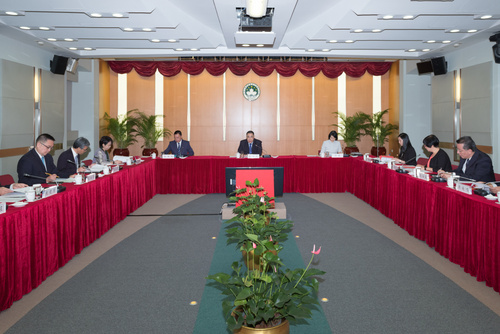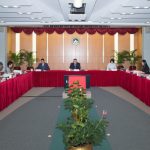 The Chief Executive and Chairman of the Committee for Development of the Commercial and Trade Cooperation Service Platform between China and Portuguese-speaking Countries, Mr Chui Sai On, presides over the second plenary meeting of the Committee.
The Chief Executive and Chairman of the Committee for Development of the Commercial and Trade Cooperation Service Platform between China and Portuguese-speaking Countries, Mr Chui Sai On, presides over the second plenary meeting of the Committee.
The Chief Executive, Mr Chui Sai On, said the Government’s effort regarding the transformation of Macao as a platform for commerce and trade further connecting China and Portuguese-speaking countries, had led to a series of achievements.
Mr Chui made the comments on Monday (10 April) during the second meeting of the Committee for Development of the Commercial and Trade Cooperation Service Platform between China and Portuguese-speaking Countries. The session was led by Mr Chui, as Chairman of the Committee.
The move to make Macao a commercial and trade cooperation service platform between China and Portuguese-speaking countries (known as the “Platform” policy) is endorsed by the Central Government and seeks further to engage Macao in the country’s development and to make better use of Macao’s advantages, via regional partnerships. It also aims to help diversify the city’s economy.
During Monday’s meeting, the Secretary for Economy and Finance and Vice Chairman of the Committee, Mr Leong Vai Tac, outlined the goals regarding work to reinforce existing ties between China and Portuguese-speaking countries, including:
- fostering the establishment in Macao of the headquarters of the China-Portuguese-speaking Countries Cooperation and Development Fund;
- advancing the development of Macao’s “Three Centres” strategy, and other roles for the city that relate to development of trade and financial services between the above countries;
- accelerating the development in Macao of a centre for innovation and youth entrepreneurship serving entrepreneurs based in China and Portuguese-speaking countries;
- pushing forward a pilot scheme enabling Portuguese-speaking countries to recognise officially traditional Chinese medicine;
- strengthening the promotion of information about Portuguese-speaking countries in local MICE (meetings, incentives, conferences and exhibitions) events;
- enhancing the role of Portuguese-speaking countries in the International Infrastructure Investment and Construction Forum;
- speeding up the establishment of a system for trade credit insurance involving those countries;
- arranging visits to Brazil and Portugal, involving the participation of delegates from the Pan-Pearl River Delta Region; and
- strengthening exchanges between Portuguese-speaking countries and mainland China, and between countries and places covered by the Silk Road Economic Belt and the 21st-Century Maritime Silk Road (collectively known as the “Belt and Road” initiative).
During the meeting, Committee members highlighted the recent setting up of a Macao preparatory committee, to include the city’s major commercial associations and similar associations from Portuguese-speaking countries. The body will be tasked with pushing forward the establishment of a new forum, to be called the Association of Enterprise Directors of China and Portuguese-speaking Countries, and first announced in 2016.
Committee members also gave an update at Monday’s meeting regarding the establishment of, respectively: a business and trade service centre for the small- and medium-sized enterprises in Portuguese-speaking countries; a goods distribution centre; and a convention and exhibition centre for economic and trade cooperation between China, Macao and Portuguese-speaking countries (collectively known as the “Three Centres” strategy).
To drive development of the connections between Macao, mainland China and Portuguese-speaking countries, the Government had outlined a series of initiatives in its first Five-Year Development Plan, which is a blueprint for the city’s socio-economic development spanning the period 2016 to 2020. It aims to boost Macao’s contributions to the country’s “Belt and Road” initiative, via the city’s extensive network of returned overseas Chinese, as well as via its close ties with Portuguese-speaking countries and places in Southeast Asia.
Premier of the State Council, Li Keqiang, announced – during his visit to Macao in October 2016 – a number of measures to strengthen Macao’s bridging roles in connecting China and Portuguese-speaking countries.
The Committee for Development of the Commercial and Trade Cooperation Service Platform between China and Portuguese-speaking Countries was created in February 2016 as a way of pushing forward Macao’s “Platform” policy. The Committee’s first meeting was held in June 2016.


